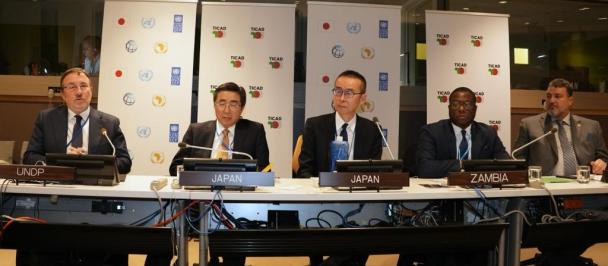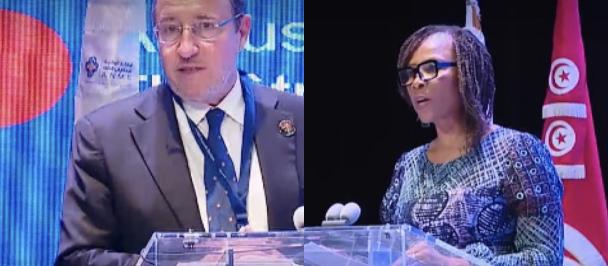AFRI CONVERSE
Green business crucial to mitigating and adapting to the effects of climate change in Africa
September 12, 2022
With Africa on the frontline of the world’s climate emergency and ecological crisis, the need for increased commitment and investment towards a green transition is now more pressing than ever, according to panelists at the recent third 2022 AFRI CONVERSE session.
The event took place within the context of sharing experiences from Tunisia, host of the upcoming Eighth Tokyo International Conference on African Development (TICAD8), and focused on the impact of climate change and opportunities for ‘going green’ with business engagement to help mitigate the effects of climate change.
Expert speakers examined best practices and lessons learnt through multi-dimensional approaches in Tunisia to tackle challenges in promoting a ‘green’ economy and discussed creating an environment to increase national and foreign investment from Japan and other countries.
Professor of Economics at University Côte d’Azur, Mr. Adel Ben Youssef, who moderated the session, stressed that climate change is everywhere, and everybody is feeling its impact.
The effects of climate change pose a major challenge to the continent’s achievement of the Sustainable Development Goals (SDGs), impacting on economic growth, society and peace and stability.
However, he reminded panelists that climate change is also an opportunity for the continent to challenge its business market and innovation skills by introducing renewable energy in business. “All actors have a role to play, especially the private sector, which can lead the ‘green’ economy on the continent,” he said.
Chief Representative of the Japan International Cooperation Agency (JICA) in Tunisia, Mr. Shuhei Ueno, highlighted approaches with which JICA aims to tackle climate change in Africa. He stressed the need to implement the Paris Agreement and use climate finance to increase the number of countries supported in formulating and implementing climate change plans.
Under the Paris Agreement, countries are committed to limiting global warming to well below 2°C and pursuing efforts to limit it to 1.5°C. It also aims to strengthen countries’ ability to deal with the impacts of climate change and support them in their efforts.
Reinforcing JICA’s commitment to supporting the institutionalization of ‘green’ economic development in Africa, Mr. Ueno noted mitigation and adaptation as two approaches that JICA is using to address climate change on the continent. Mitigation, he said, provides for reducing greenhouse gas emissions, especially in energy and transportation, and through growing and restoring forests to absorb CO2. Meanwhile, adaptation provides for building a climate change resilient society through disaster risk management.
Japan’s Ambassador to Tunisia. H.E. Shinsuke Shimizu, said the ‘green’ economy in Tunisia and the continent remains a challenge — particularly in the areas of fuel, gas and energy — and that the introduction of renewable energy should be a priority for mitigation and adaptation.
Mr. Shimizu also highlighted the importance of the private sector and innovations by start-ups, particularly with regard to green business, in Tunisia and the rest of the continent. He asserted a willingness to support Tunisia in combating climate change and water scarcity, citing projects that are underway for water desalination.
At the same time, climate change provides opportunities for African countries to harness their huge resource potential to achieve SDG targets. Addressing climate change in Africa will create significant market opportunities, especially for the private sector and institutional investors.
“This edition of the TICAD will be special because it is in Tunisia and it is close to the Middle East, Europe, and Africa. The new TICAD8 (hybrid) format will offer the platform to discuss all these issues and increase partnership between Africa and Japan,” he said.
Ms. Eugena Song, Deputy Resident Representative of the United Nations Development Programme (UNDP) in Tunisia, said it is crucial to have inclusive policies that empower women and the youth to contribute to the ‘green’ economy.
Ms. Song highlighted the importance of Tunisia’s efforts to reduce its dependence on imported fossil energy, in line with country’s Nationally Determined Contributions (NDCs).
“Requirements to meet the NDCs in Tunisia are $19.4 billion,” she said, adding that Tunisia’s achievement of its goal would generate profitability and employment. “This would be a win for a country like Tunisia, particularly as 35% of its population are youth.”
Ms. Song also indicated that removing subsidies from fossil energy and directing them to investing in renewable energy would be an important step towards energy transition.
Echoing the sentiments of UNDP, Mr. Mohamed Zmerli, Director of the National Climate Change Coordination Unit and National Focal point for the United Nations’ framework for Climate Change Convention (UNFCCC), highlighted the need to engage in dynamic inclusive development.
Mr. Zmerli said reversing the process of degradation and depletion of natural resources, and optimising synergies between greenhouse gas mitigation and resilience, particularly in the areas of water, soil and ecosystems, are a priority for the continent’s successful transition to a ‘green’ economy.
Mr. Hamadi Boubakri, a member of the Executive Office in charge of water resources at the Tunisian Union of Agriculture and Fishing, presented the main challenges they were facing in Tunisia and made some recommendations that can contribute to developing and sustaining a safe practice and transition through ‘green’ business in Tunisia.
He stressed that collaboration and cooperation with other entities are prerequisites for a successful ‘green’ transition in Tunisia and the rest of the continent.
Mr. Boubakri highlighted the following points for countries to consider:
- Develop innovative and efficient policies, including on all actors who contribute to the green economy.
- Increase cooperation between countries in sharing experiences.
- Facilitate equal access to water and renewable energy for farmers and fisheries.
- Develop a funding mechanism for all with the support of financial partners and the UN.
In order to confront the challenges presented by climate change, Mr. Boubakri said it is necessary to have clearly defined policies that are based on a vision that take into account the social and economic aspects at the macro and micro level.

 Locations
Locations


